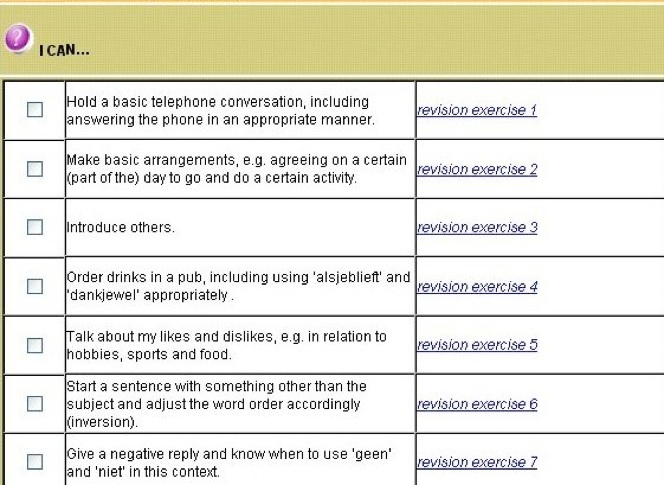
A Journey Through Online
Language Learning

Activities > Transferable Skills
Things to consider
Transferable skills are those which are developed in one (learning) situation and can be transferred into another. They are also known as key or generic skills. Transferable skills enhance the subject, and and students acquire study-specific skills as a matter of course. Examples of transferable skills include oral and written communication skills, presentation skills, managing one’s own learning, self-assessment, team-work and time-management.
Transferable skills can be an integral part of blended learning or wholly online language materials, as the Dutch online courses Lagelands, Business Dutch and Hogelands show. They can be an element of comprehensive courses, such as Hogelands, or specific-skills courses, like the Business Dutch course, and be developed for all levels.
Hogelands, which is aimed at intermediate / advanced students, is an especially interesting example in this context. It develops not only students’ written and oral communication skills in Dutch, but also on a more general level. The skills-based approach of the course facilitates its focus on teaching transferable skills. The oral assignments of Hogelands include discussions and debates between peers, and presentations given by students. The written activities include argumentation, summarizing, letter writing, using dictionaries etc. The activities come complete with detailed guidelines and learning tips in English and Dutch on, among others, how to debate, how to present arguments, and how to summarise a text (example). Other resources in the course teach students how to develop further the main language skills of reading, writing, listening, grammar and vocabulary (example). The skills taught in this context are all transferable and can be applied in new situations or when studying other languages. The oral activities also promote teamwork as they allow students to work together with their peers, and in the case of the wholly online course Hogelands, direct communication takes place in a video conference.
The beginners’ Dutch courses Business Dutch and Lagelands are good examples of how students can be encouraged to take responsibility for their own learning, and how to manage and assess their learning process and study time. Every chapter of Lagelands finishes with a so-called ‘checklist for revision’ to help students assess whether they have mastered the functions, grammar and vocabulary necessary to continue to the next chapter. They also offer further self-correcting revision exercises and tasks in case students do not consider themselves ready to start on the new chapter.

- Do you want to include teaching transferable skills in your materials? If yes, which transferable skills would you like to focus on? Note that including resources on transferable language skills as in the case of Hogelands may mean adding a considerable amount of work to your work-load.
- What language materials do you want to develop and how can teaching transferable skills be integrated into this material?
Examples:
- Lagelands
- Hogelands
- Business Dutch
Example of so-called Checklist in Lagelands. Students assess whether they have mastered the functions, grammar and vocabulary necessary to continue to the next chapter. There are links for every topic to extra self-correcting exercises and tasks.
The Business Dutch course offers to its students, every five chapters, a series of self-correcting exercises, that come complete with score boards, testing the students’ knowledge of Dutch vocabulary and grammar as well as the skills taught in the last five lessons (example). Students are encouraged to review specific parts of the last chapters if their scores are low before starting on the next block of the course.
Disclaimer I Freedom of Information I Accessibility I Contact Us
University College London, Gower Street, London, WC1E 6BT Tel: +44 (0) 20 7679 2000
© UCL 1999–2011